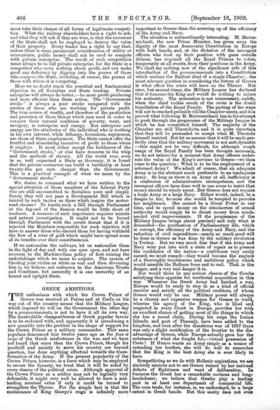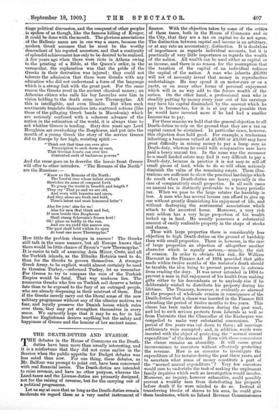GREEK AMBITIONS.
THE enthusiasm with which the Crown Prince of Greece was received at Patras and at Corfu on his way out of the country means that the Military League, which imposed its will on the Government the other day by apronunciamiento, is not to have it all its own way.
incalculable ncalculable changeableness of Greek popular favour is to be reckoned with, and apparently it is introducing a new quantity into the problem in the shape of support for the Crown Prince as a military commander. This same populace denounced him twelve years ago as the fans et vivo of the Greek misfortunes in the war, and we have not heard that since then the Crown Prince, though his goodwill and anxiety to serve his country are beyond question, has done anything effectual towards the trans- formation of the Army. If the present popularity of the Crown Prince, however, is a force which may be employed to secure the dynasty, we trust that it will be aided by every chance of the political crisis. Although approval of the Crown Prince as a soldier may not be logically very defensible, it might very well be allowed to have a. mis- leading nominal value if only it could be turned to strengthen the Throne. For the simple fact is that the continuance of King George's reign is infinitely more important to Greece than the screwing up of the efficiency of the. Army and Navy.
The situation is extraordinarily interesting. M. Mavro- raichaeli, the new Prime Minister, has given away the dignity of the most democratic Constitution in Europe with both hands, and, at the dictation of the insurgent officers who took up their position with guns outside Athens, has required all the Royal Princes to retire, temporarily at all events, from their positions in the Army. We shall say nothing now of the significant side of this introduction of the pranun,ciamionio into a Constitution which realises the Radical ideal of a single Chamber ; the most relevant question in considering the future of Greece is what effect the crisis will have on the Throne. Not once, but several times, the Military League has declared that it honours the King and would do nothing to injure his authority. The reiteration is not unnecessary, surely, when the chief visible result of the crisis is the direct humiliation of the Royal Family. The parting of the ways will not be reached probably till the Chamber meets, and it is proved what following M. Mavromichaeli has in his attempt to push through the programme of the Military League to which he has committed himself The majority of the Chamber are still Theotokists, and it is quite uncertain that they will be persuaded to accept what M. Theotoki himself resisted. But let us assume that it will be made per- fectly clear that the military movement is not anti-dynastic —this might not be very difficult, for although rough usage of the Royal Family has been thought necessary, we do not believe for a moment that Army officers under- rate the value of the King's services to Greece—we then come to the question : What is to be the employment of a reformed Army ? We admit, of course, that an adequate Army is in the abstract much preferable to an inadequate Army. So long as there is an Army at all, inefficiency is a confession of administrative incompetence, and the insurgent officers have done well in one sense to insist that money should be wisely spent. But Greece does not require a large Army or a large Navy. Either would, indeed, be a. danger to her, because she would be tempted to provoke her neighbours. She cannot be a Great Power in our time, and to spend money on the simulacrum of armed authority would simply be to divert money from much- needed civil improvements. If the programme of the Military League brings about precisely and only what is demanded—the purification of Parliamentary life, which is corrupt, the efficiency of the Army and Navy, and the reduction of civil expenditure nearly as much good will be done in Greece as was done by the military revolution in Turkey. But we very much fear that if the Army and Navy were put into such a state of repair as to possesi the confidence of the nation—a confidence very easily earned, we must remark—they would become the engines of a thoroughly troublesome and ambitious policy which would unsettle the Balkans from end to end. That is the danger, and a very real danger it is.
Nor would there be any serious chance of the Greeks satisfying their appetite for territorial acquisition in this way. Whenever the Greek Army had finished a war Europe would be ready to step in as a kind of official receiver and satisfy all the political creditors, of whom Greece would only be one Military power will always be a clumsy and expensive weapon for Greece to wield, whereas the agency of the King, who is liked and respected in every Court in Europe, provides her with an excellent chance of getting most of the things to which she has a moral claim. I'uring his reign the Ionian Islands, and part of Thessaly, have been added to the kingdom, and even after the disastrous war of 1897 there was only a slight rectification of the frontier to the dis- advantage of Greece, while Europe actually gave her the substance of what she fought for,—virtual possession of Crete ! If Greece wants an Army simply as a means of extending' her borders, she will do well to remember that the King is the best Army she is ever likely to have.
Sympathising as we do with Hellenic aspirations, we are sincerely anxious not to see Greece ruined by her national defects of flightiness and want of deliberation.
business the Greek has a remarkable coolness and long- headedness ; we believe that Greeks play a leading part in at least one department of commercial life. The corn trade, for instance, is, we understand, to a large extent in Greek hands. But this sanity does not even tinge political discussion, and the conquest of other peoples • is spoken of as though, like the famous killing of Kruger, . it could be done with the mouth. The glorious associations . of the Hellenic name are in one way a snare, because the modern Greek assumes that he must be the worthy descendant of his reputed. ancestors, and that a continuity of splendid achievement has only to be desired. to be realised. A few years ago when there were riots in Athens owing to the printing of a Bible, at the Queen's order, in the vernacular, the explanation was that the pride of the Greeks in their derivation was injured ; they could not tolerate the admission that there were Greeks with any education who did not understand a form of the language which is a strong link with the great past. For the same reason the Greeks revel in the ancient classical names • an Athenian citizen who calls his boy Leonidas sees Mill in vision holding to the death some new Thermopylae.. All this is intelligible, and even likeable. But when such sentiments translate themselves into scattered actions (like those of the pillaging Greek bands in Macedonia) which are seriously confused with a coherent advance of the nation in the estimation of the world., it is always time to ask whither Greece is tending. Sixty-five years ago Lord Houghton sat overlooking the Bosphorus, and put into the mouth of a young Greek the story of the service Greece did to Europe by her high, resisting spirit :— " Think not that time can ever give
Prescription to such doom as ours, That Grecian hearts can ever live Contented serfs of barbarous powers."
And the verse goes on to describe the heroic front Greece will offer to other intruders. " The Romans of the North" are the Russians :— "Know ye the Romans of the North :
The fearful race whose infant strength Stretches its arms of conquest forth To grasp the world in breadth and length ?
They cry 'That ye and we are old, And worn with luxuries and cares, And they alone are fresh and bold, Time's latest and most honoured heirs'!
Alas for you! alas for us !
Alas for men that think and feel, If once beside this Bosphorus Shall stamp Sclavonia's frozen heel !
Oh ! place as boldly in the van, And ere we yield this narrow sea, The past shall hold within its span At least one more Thermopylae."
How little the problem changes in essence ! The Greeks still talk in the same manner, but all Europe knows that 'there would be little chance of Byron's "new Thermopylae." It is easier to talk of annexing Asia Minor, Crete, and all the Turkish islands, as the Ethnike Hetairia used to do, than for the Greeks to govern themselves. A stronger Greek Army, to be explicit, would almost certainly be used to threaten Turkey,—reformed Turkey, let us remember. -For Greece to try to compass the ruin of the Turkish -Empire would be fatal. That way madness lies. The numerous Greeks who live on Turkish soil deserve a better fate than to be exposed to the fury of an outraged people, who are already deepening in their mistrust of them. But if the Greeks merely carry out the literal sense of the new military programme without any of the ulterior motives we fear, and loyally preserve the Danish house which rules over them, they may yet strengthen themselves in every sense. We earnestly hope that it may be so, for in his heart no Englishman desires anything but the safety and happiness of Greece and the honour of her ancient name











































 Previous page
Previous page